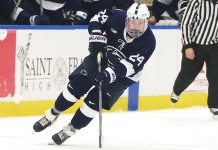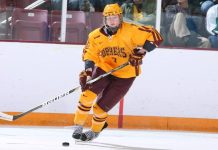In a monumental shift in NCAA eligibility standards, Division II delegates at the annual NCAA Convention, passed legislation on Monday deregulating amateurism.
The delegates enacted the legislation by a 217-29-2 vote.
The vote came on the same day Division I delegates were discussing a similar package aimed at changing the definition of amateurism. This was the last opportunity for the entire membership to discuss the topic before the Management Council meeting in April, where a vote is scheduled.
The amateurism deregulation package, which has been tweaked for almost two years since the original proposal, and was first discussed on USCHO last fall, would change the definition of amateurism from one based on whether someone was compensated for their play, to one based upon the amount of competition someone has participated in.
These proposals have far-reaching impacts on all sports, not the least of which is ice hockey.
Monday’s session was dominated by football and basketball officials, concerned about how the new proposals would affect their sport.
“The forum was to give our member schools an opportunity to voice their opinions and perhaps make suggestions on what the approach should be,” said NCAA spokesperson Jane Jankowski.
The deregulation package would affect students who have yet to enroll in college. The so-called pre-enrollment package would allow prospective student athletes to:
Jankowski said it is possible this package could be split and voted upon separately.
The NCAA’s Subcommittee on Amateurism and Agents was in charge with coming up with the initial proposals. After a two-year study, it concluded that accepting money and being drafted, for example, does not, in itself, constitute an unfair competitive advantage. Instead, they concluded, the standard for eligibility should be based upon the time spent playing competitively in that sport.
Initially, that meant the clock would start ticking on a player from the time they were 18. But the impact on hockey would have been enormous, moreso than most sports. It meant that any player going to the USHL for two years, would have to sit two years before playing in college and only have two years of eligibility remaining.
After meeting with hockey officials, the NCAA’s subcommittee included an amendment giving a one-year waiver to prep school players, and two-year waiver to Jr. A players.
Nonetheless, the proposal would still have far-reaching impacts on hockey, because this would mean that major junior players — as of now considered professionals by NCAA standards — would be able to leave at will to come to college, without any penalty (assuming it was before 18 years old).
However, hockey people could not reach a consensus on whether this was good or bad for college hockey. Thus, another amendment was passed this summer, saying that a major junior player who wants to enter college, has to sit out a year and lose a year of eligibility for each season of major juniors he played, effectively, in this specific instance, erasing the intent of the amateurism proposal.


